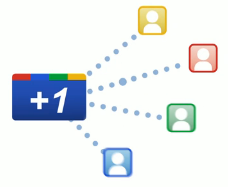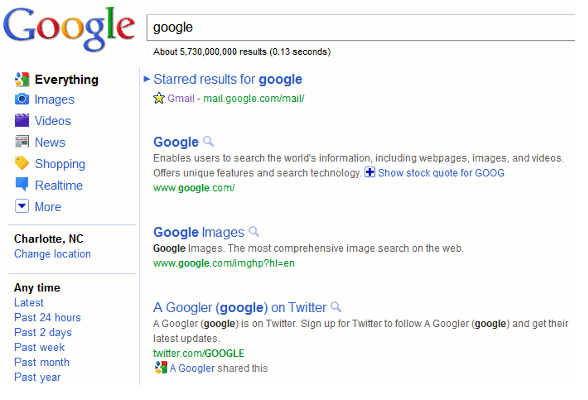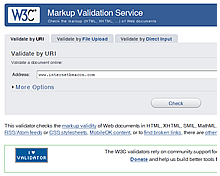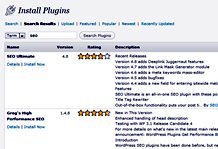Archive for the ‘Search Engine Optimization SEO’ Category
Description of ‘Search Engine Optimization SEO’ Category:
The method of improving the volume and quality of traffic to your website from Search Engines.
Wednesday, August 3rd, 2011
Most people can agree that social media has drastically changed the way businesses perform online marketing. Social media sites like Facebook and Twitter have provided businesses with the resources to create detailed portfolios and interact freely with their customers. Some companies even believe that Search Engine Optimization (SEO) is no longer important and social media should be their main focus.
Does SEO still matter? Social media sites have done a great job of connecting businesses with customers. However even with all the advantages that social media has to offer it shouldn’t replace SEO. Instead social media websites should be thought of as a complement to SEO rather than its substitute.
There are many benefits to using social media like attracting new clients, staying in contact with clients, and the ability to build a positive reputation. It’s clear that due to its popularity social media has begun to push other key SEO elements into the background but that doesn’t mean those elements are not still important. As important as Social media is it remains only one portion of the SEO puzzle. The following is a list of reasons why SEO still matters.
1. SEO Finds The People That Want to Find You!
Social networking will put you in front of other social media users but that doesn’t mean they are customers. With SEO you have a better chance of being found by buyers. Social media is often used to communicate with users that are already part of your circle whereas SEO can be used to draw in users to your circle.
2. SEO Provides More Relevance to Customers!
Social media can increase awareness of your company but with Search Engine Optimization you can specifically target customers seeking your product or service. SEO helps you rank for relevant searches which increases the chance of conversion. Additionally each keyword can be optimized to target a different group of consumers.
3. SEO Enhances The Conversion Process!
As mentioned, SEO focuses more on increasing the chances of conversion. SEO focuses on streamlining the conversion process. Every step… Read the rest
Tags: Internet Marketing, marketing, media, search engine optimization, seo, social, Social Media
Posted in Internet Marketing, Search Engine Optimization SEO, Social Media Marketing | No Comments »
Friday, July 22nd, 2011
In February 24, 2011 Google introduced its new method for evaluating the quality of a website. Google Panda or “The Panda Algorithm” affected a little under 12% of search results and drastically reduced page visitors for many websites. At first 12% may seem like a small percentage but when considering the size of internet the figure becomes fairly significant. Google released Panda 2.0 in April and followed with version 2.1 in May. According to Search Engine Land Google had also just recently released its newest version (Panda 2.2) sometime during June.

from http://www.google.com/logos/logos11-2.html, July 2011
The Panda version 2.2 updates are thought to be the source behind the recent fluctuation in search listings and PageRank. Whether you experienced this change back in February or the new update is finally catching up with you, Google Panda seems to be impacting a tremendous number of websites and site owners across the Internet.
Although it is commonly called the Panda Algorithm, Google Panda is more of an individual Ranking factor rather than an entire new algorithm. Google uses a number of different factors when assigning a rank to a website. These factors are continually tweaked in order to provide the best user experience and return the most relevant search results. Search Engine Optimization (SEO) focuses on these evolving factors in an effort to increase site traffic and conversion rates. Although Google makes these adjustments to its ranking algorithm on a regular basis they usually go unnoticed or cause minor changes for most websites. However there have been a few major exceptions similar to the Google Panda update such as the Mayday Update of last year and the Vince Update in 2009.
How does Google Panda work? Google Panda acts as a filter to identify low quality pages. According to Matt Cutts the Panda Filter is not running all the time. Instead Panda performs periodic scans that occur during… Read the rest
Tags: Google, google pagerank, google panda, PageRank, panda, panda update, panda version 2.2, rank, ranking algorithm, update
Posted in Google, Search Engine Optimization SEO | No Comments »
Wednesday, June 8th, 2011
Back in March Google began rolling out their +1 feature locally on their Google results page. The new feature enables users to activate the Plus 1 button when they wanted to recommend a website to other users. Since Facebook did not want to have their Like Button located on the Google search results page and chose to showcase it on Bing instead, Google has taken action and created its own way to boost social interaction. Similar to the Facebook Like Button, the plus 1 feature lets users put their stamp of approval on a website.

From http://www.google.com/+1/button/, June 2011
Exactly one week ago on June 1, 2011 Google announced that they are now offering the +1 button to website developers to place on their own content. On the day of the announcement the +1 buttons started appearing on major websites like Bestbuy.com, TheHuffingtonPost.com, and Nordstrom.com. After only a week the button now appears on large and small websites all across the Internet. Websites can display the button and enable people to recommend their website, blog or even individual products. Already the Google +1 feature seems to have a solid foundation but it continues to work towards being as widely used as its Facebook counterpart. From what we can tell here at Internet Beacon, the Google +1 button is being used frequently on the search results page but doesn’t quite yet have the exposure necessary to properly compete with the Facebook and Twitter sharing buttons that are on individual websites. In time this could change drastically, after all the button is only a week old.
It makes sense that Google would eventually assign some sort of values to this feature where the more plus ones a website has would equal a rank better, however it is still unclear how this development will affect SEO and the Google website ranking algorithm. Google could determine that sites who… Read the rest
Tags: +1, Google, Google Plus 1, search engine, Search Results, seo, social networking
Posted in Search Engine Optimization SEO, Search Engines, Social Networking | No Comments »
Friday, May 13th, 2011
Recently Google has begun testing a new search engine results page (SERP) with a limited group of Google users. It is unknown what criteria Google used to determine which users were given this opportunity and because there is no opt in for testing most users can only experience the new page via screenshots.
It remains unclear whether or not Google will further expand this sample testing or even continue in the same direction once they acquire usability feedback. Due to the limited testing being fairly recent no real results have been released other than the initial feedback from users that the new page is ugly or that it looks better, which really depends only on the users taste and not the designs usefulness.

From Google, May 2011
For the users that were not selected to participate in the new  search results page trial you can view the changes at Google’s New Search Interface. As you can see from the screen capture it seems that Google has eliminated or scaled down the amount of information provided for each search result. The text has also decreased in size and appears cleaner with more white space. The older results page features a darker blue, green, and purple text color whereas the new page showcases brighter but muted pastel colors. The new colors go a long way to make the page look prettier but don’t offer the same contrast as the old page and instead can make it harder for some users to view because the bright on white color scheme. In addition there is also less page identification because the page title is no longer underlined. search results page trial you can view the changes at Google’s New Search Interface. As you can see from the screen capture it seems that Google has eliminated or scaled down the amount of information provided for each search result. The text has also decreased in size and appears cleaner with more white space. The older results page features a darker blue, green, and purple text color whereas the new page showcases brighter but muted pastel colors. The new colors go a long way to make the page look prettier but don’t offer the same contrast as the old page and instead can make it harder for some users to view because the bright on white color scheme. In addition there is also less page identification because the page title is no longer underlined.
Whenever there is a change with Google we have to ask how will this impact Search Engine Optimization? The main concern with this trial SERP is with the increase in white space between search results. Although the page certainly looks cleaner, the insertion of more space creates… Read the rest
Tags: Google, Internet Marketing, results, search engine, Search Results, SERP, Testing, user
Posted in Search Engine Optimization SEO, Search Engines | 2 Comments »
Thursday, April 28th, 2011
Does code validation really matter and if so to whom does it matter to, a website visitor, a search engine, both? Not everyone thinks that code validations are all that important and feel that search engines do not consider validation when ranking a website. Regardless of the impact that code validation has on a websites ranking, both sides of this discussion can agree that code validation is useful for a number of other reasons.

http://validator.w3.org/
Code validation is the process of inspecting and amending the code or your web documents. This is done by comparing the code to formal standards like those established by the World Wide Web Consortium (W3C). The W3C is the main international standards organization for the Internet. This organization offers a markup validation service to check HTML documents for errors and ensures that they are in accordance with their standards. To fully validate a websites code two separate assessments need to be performed, one for the HTML or XHTML and another for the Cascading Style Sheets (CSS). Although a number of programs like XHTML-CSS offer code validation services that are based on the standards set forth by the W3C it might be best to use the actual html validator and css validator provided by the World Wide Web Consortium.
Getting back to why it is important to validate your code regardless of how it impacts the page rank, of the many reasons for validation there are 6 fundamental reasons why it should be done.
Debugging and Maintenance:
HTML and CSS validation works similarly to a spell checker by locating errors found throughout your web documents. During the validation process errors are identified and documented so that a user can easily fix them.
Learning and Prevention:
As the validation process identifies common errors you can learn from your mistake and therefore prevent the… Read the rest
Tags: browser, code, errors, html validation, search engines, standards, validation, W3C, World Wide Web Consortium
Posted in Search Engine Optimization SEO, Web Development, Web Tips | No Comments »
Friday, April 22nd, 2011
Search engines take into consideration a large number of factors when assigning a rank to a website. Although there are a number of factors that are obvious or specifically identified as ranking factors, the majority of the ranking criteria are kept private. Search engines avoid publicizing the exact pieces of the Search Engine Optimization puzzle that they use to determine a rank because it would most likely lead to a massive overflow of irrelevant search results.
Search Engines recognize that if all the sites on the Internet knew the characteristics that they use, then every site would be able to rank higher. Providing this information would make it too easy for website and go against their main goal which is to provide users with the most relevant and useful search results. Clearly expressing the measurements that are used to rank a website would prevent a relevant site from standing out amongst the other results and could potentially place a higher rank on a page that is worst or is less relevant to a user.

Search Engines use both on-the page as well as off-page elements to assign a rank. On-page factors usually focus on internal site structure including keyword use and internal linking where as an off-page aspect considers who you link to, how you link to them, and the popularity or relevance of your links. Some of the factors that are known or thought to be important to ranking well in search engines include:
- Keyword in the pages Title Tag.
- Appropriate and descriptive anchor text of Inbound Links.
- Global Link Popularity of Site.
- Age of domain.
- Link Popularity or equity within the internal link Structure.
- Relevance of an inbound link to the site and the text surrounding that link.
- Keyword use throughout the body copy.
- The popularity or authority of the website providing an inbound link.
With that being said, one of the major factors that search engines do directly distinguish as being harmful to a Websites rank is Duplicate Content. Duplicate Content is best described as a portion or… Read the rest
Tags: content, duplicate, duplicate content, inbound link, link, rank, search, search engine, website
Posted in Internet Marketing, Search Engine Optimization SEO, Web Tips | No Comments »
Friday, April 1st, 2011
 The number of users who access the Internet using their mobile device continues to grow each and every day. Approximately more than half of the people who use the Internet access it regularly from a mobile device. As new mobile devices are introduced and as mobile web browsers advance mobile web browsing further solidifies itself as a permanent fixture in our everyday lives. When considering how many or your potential customers are accessing the Internet via their mobile phone you should be asking yourself, is your website mobile friendly? The number of users who access the Internet using their mobile device continues to grow each and every day. Approximately more than half of the people who use the Internet access it regularly from a mobile device. As new mobile devices are introduced and as mobile web browsers advance mobile web browsing further solidifies itself as a permanent fixture in our everyday lives. When considering how many or your potential customers are accessing the Internet via their mobile phone you should be asking yourself, is your website mobile friendly?
The advances of mobile devices has made tremendous progress however many sites that are not optimized for the mobile web often get lost in translation and present a less than desirable user experience. Due to the quick advancements and development it is probably only a matter of time till mobile browsing can offer an experience equal to that of regular Internet browsing. So, another important question to consider would be is the benefit of mobile optimizing worth the effort or would it make more sense to wait a year or two until mobile browsing possess the same technology and capabilities of traditional Internet browsing?
Most of the time if a user is accessing your website from a mobile device there is a higher urgency to make a purchase or perform a critical action such as finding directions to your brick and mortar store or acquire some kind of contact or customer support. I think it is clear that depending on the type of business and the needs of the customers it is probably worth the effort or at the very least wouldn’t hurt to make your website a mobile companion. The following are suggestions to assist you in making your website more compatible with the mobile web environment as opposed to creating an additional website solely for mobile users.
- Test your sites mobile compatibility
Before you make any adjustments to your site you should first test it and see if any changes are necessary. To do this you can navigate to your site on any mobile device or download mobile
… Read the rest
Tags: Browsing, content, internet, link, Mobile, mobile device, Mobile Web, user, web, web browsing
Posted in Mobile Web, Search Engine Optimization SEO | 2 Comments »
Friday, February 25th, 2011
 The time that it takes for a website to load is commonly referred to as site speed. Site speed is measured from the moment a link is accessed or after a URL is entered into the browser search. Depending on the type of website or how heavy its content is, a site’s speed is typically between 2-5 seconds. At any rate below 2 seconds a website’s speed is thought to be excellent. A speed between 2-5 seconds might not be the fastest, however it is perfectly acceptable. Anything taking 5 seconds to load can annoy or turn away visitors and be less popular with search engines. The time that it takes for a website to load is commonly referred to as site speed. Site speed is measured from the moment a link is accessed or after a URL is entered into the browser search. Depending on the type of website or how heavy its content is, a site’s speed is typically between 2-5 seconds. At any rate below 2 seconds a website’s speed is thought to be excellent. A speed between 2-5 seconds might not be the fastest, however it is perfectly acceptable. Anything taking 5 seconds to load can annoy or turn away visitors and be less popular with search engines.
A site’s speed is only one of the many factors that search engines utilize in their website ranking algorithm. Search engines employ ranking algorithms in order to assign a page rank to a website and to ensure that a search returns with the best and most relevant results. The following are options that site owners can apply to their sites in order to reduce the time it takes for their website to load. Reducing a sites load time or increasing a sites speed will generate better customer responses as well as appeal more to search ranking algorithms.
Before attempting the following suggestions you should try out these free tools to see how your site measures up. Pingdom Load Time Test is an easy tool that allows you to assess the speed or your website. The program GTmtrix analyzes site speed, provides a grade for your website and generates a list of potential problems that they recommend that you fix. These are just two of the many free tools available to measure the performance of your website. Upon completion of these tests, if you are unsatisfied with your websites performance we recommend implementing the following changes.
Compress your Website:
Website data compression converts all of a website’s text elements that are written in HTML, CSS, and JavaScript into bundles. After the compression process is complete websites no longer have to send and recognize each individual file.… Read the rest
Tags: search, search engine, site, speed, website
Posted in Search Engine Optimization SEO | 1 Comment »
Friday, February 18th, 2011
 WordPress is a web-based software that allows users to create and manage websites and blogs. The open source structure enables people from around the world to contribute to and maintain their WordPress website whether on WordPress’ web server or installed on their own web server. Although WordPress initially began as a blog tool it has developed into something so much more. By utilizing plug-ins, widgets, and themes users have the opportunity to fully customize their experience. A plug-in is software that can be added to existing software, like WordPress, which adds a new specific capability to the larger software application. For a full list of WordPress product features visit WordPress Product Features. WordPress is a web-based software that allows users to create and manage websites and blogs. The open source structure enables people from around the world to contribute to and maintain their WordPress website whether on WordPress’ web server or installed on their own web server. Although WordPress initially began as a blog tool it has developed into something so much more. By utilizing plug-ins, widgets, and themes users have the opportunity to fully customize their experience. A plug-in is software that can be added to existing software, like WordPress, which adds a new specific capability to the larger software application. For a full list of WordPress product features visit WordPress Product Features.
There are over thirteen thousand plug-ins available for the WordPress software making it extremely easy to tailor it to your specific uses. The following are some useful SEO plug-ins that the WordPress open source community has provided.
All-in-one SEO plug-ins such as WordPress SEO and SEO Scribe are designed to perform overall multiple SEO tasks that include optimizing content faster, providing great keywords, maintaining reader engagement, constructing quality links and increasing traffic! Most of the all in one SEO plug-ins operate similarly and perform similar functions. The following are among the most utilized all-in-one SEO WordPress plug-ins:
Below is a list of related, individual plug-ins that can be helpful in improving your blog or website’s Search Engine Optimization and enhancing Social Media Marketing:
AddToAny Share/Bookmark/Email:
AddToAny creates a customizable panel that showcases social networking sites. It makes it extremely easy and convenient for a visitor to submit to any social networking sites. The share menu organizes the social media sites according to most visited.
SEO Friendly Images:
The SEO Friendly Images WordPress plug-in automatically adds the “ALT” and “title” attributes to any images on your
… Read the rest
Tags: Blog Hints, link, plug, plugins, search, seo, site, title, Wordpress, wordpress plug ins
Posted in Blog Hints, Internet Marketing, Search Engine Optimization SEO, WordPress | No Comments »
Friday, February 11th, 2011
Advertising in any form has the goal to attract more customers and more revenue. Like advertising on television or in print ads, the world of online advertising shares the same purpose.

Basically online advertising sets out to attract customers by using the Internet, with websites and search engines as their medium. The Pay per Click (PPC) advertising model is where a host is compensated each time the promoter’s advertisement is clicked. The Cost per Click (CPC) is the actual amount that is paid out by the advertiser to either the search engine or website owner for each click that occurs. Websites that utilize this type of advertising will often present an advertisement or text link, when there is a common term between the websites keyword query and the advertiser’s keyword list. In other words, when a website has related information to the advertiser, a link will be displayed either on the side or above or in line with the website’s original content depending on the website. There are a couple different variations of pay per click online advertising which include Cost per Mille (CPM ), Cost per Visitor (CPV), Cost per Lead (CPL), Cost per Click (CPC), and Cost per Action (CPA).
When performing a search at a search engine you may have noticed that the results return with sponsored links. The sponsored links appear at the top or sides and the advertisers pay to be in these sponsored links sections. Each time a visitor accesses the site through this link, money is paid to the search engine through a prepaid account with that search engine. In order to achieve a sponsored link location websites, advertisers place bids for the amount of money they are prepared to pay per click. Since there are multiple link positions available, the highest bid is placed at the top, the next highest is placed second and so on. In addition to the websites being able to determine how much they pay per click they can also specify how much they… Read the rest
Tags: advertising, cost, engine, money, search, service, site, website
Posted in Internet Marketing, Search Engine Optimization SEO | No Comments »
|
![]()